Tetra fish are members of the Characidae family and are schooling fish. They are tranquil, colorful, and for the most part, peaceful. This makes them an ideal choice for hobbyists of all skill levels, from beginners to advanced.
It is really interesting seeing how tetras stick together in their school, which is why you must always make sure you have enough of them in your tank. But, have you ever wondered if your Neon Tetras will school with your Cardinal Tetras?
Tetra fish don’t usually school with other species because they are best adapted to swim independently. It is much easier for tetras of the same species to confuse predators if they all look the same. If the other tetras are similar, they may swim together in a larger school as a single group.
For more information about the different kinds of tetras and their schooling behaviors, continue reading because we will discuss each of the listed tetra’s behavior when it comes to schooling.
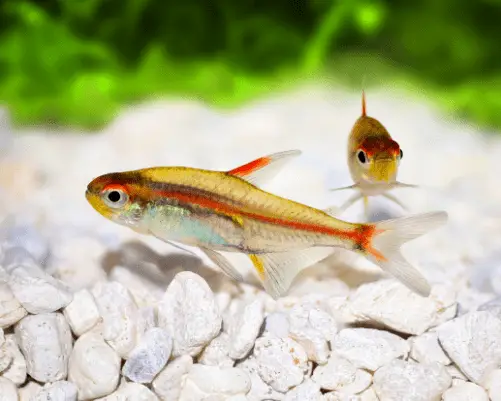
Cardinal Tetras Schooling Behavior
Aquarium hobbyists love Cardinal tetras since they are one of the most common tetras. They look a lot like neon tetras in appearance. If you’re looking for quiet schooling fish, then Cardinal tetras are your best bet.
Cardinal tetras are generally peaceful fish, but they have become aggressive in certain situations, such as when they are trying to mate or feeding. In addition, your tetras may become more aggressive if your aquarium is on the smaller side and contains a high population density.
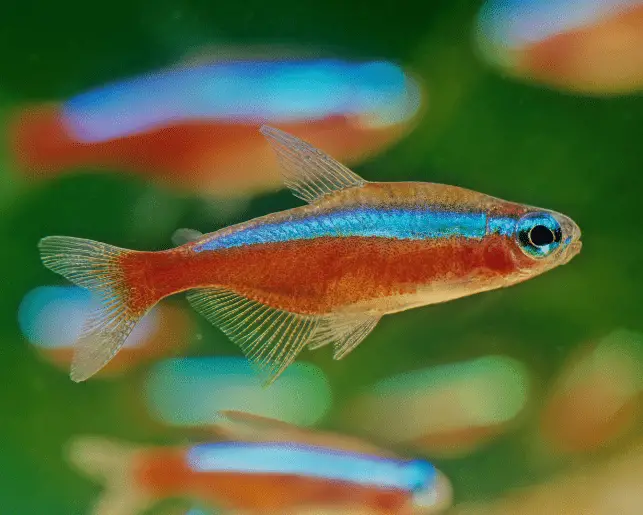
Congo Tetras Schooling Behavior
Congo tetras can get very anxious if they are not a part of a group of at least 6 of the same species. Therefore, they are also okay to be kept with other fish roughly the same size or smaller, making them more peaceful.
They do not bite the fins of other fish. But amongst themselves, they are very rowdy, constantly chasing each other and playing, and even occasionally fighting and tearing each other’s fins in these activities.
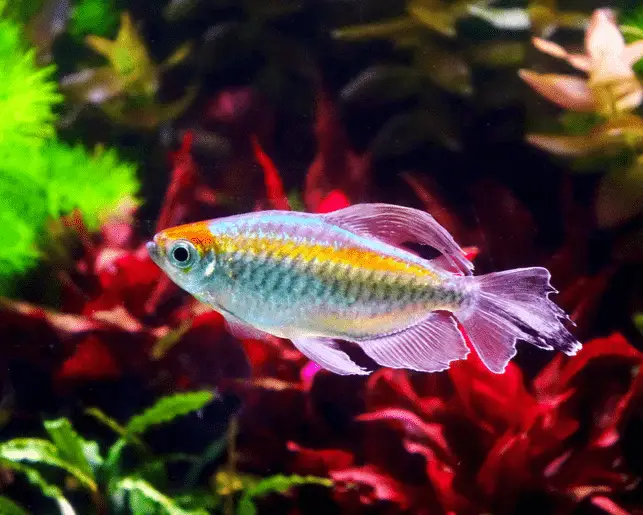
Black Skirt Tetra Schooling Behavior
Black skirt tetras are relatively peaceful fish and easy to take care for. However, the black skirt tetra is a schooling fish, and it is recommended to have at least 5 of them to keep the group happy.
They rarely show evidence of hostile conduct, no matter the situation. The only thing you need to keep an eye out for is their behavior around fish with long fins, as they have a propensity to nip at the fins of other fish.
Serpae Tetras Schooling Behavior
The Serpae tetras are considered relatively peaceful and should be kept with around half a dozen other tetras of the same species. Serpae tetras are known to be more aggressive in smaller groups and will occasionally fin nip. Except for physically separating the fish, there is no way to stop a fish from behaving in the way it does.
Although they are sometimes aggressive, it is mostly during feeding times and directed to their own species. Therefore, it is best to avoid housing this species with fish that move slowly or have long, flowing fins, such as angelfish or bettas.
Black Phantom Tetras Schooling Behavior
The black phantom tetras are generally peaceful schooling fish and perfect for community aquariums. These fish should be kept in groups of at least five or pairs at the very least. To avoid any problems relating to territory, you should ensure a balanced number of males and females.
Nipping at fins is not a typical behavior exhibited by Black Phantom Tetras under normal conditions. In most cases, they will only interact with members of their species and those of related species. If you notice your Black Phantom Tetra biting or nipping at fins, this is probably a sign of feeling threatened or stressed out.
X-Ray Tetras Schooling Behavior
The X-Ray tetras are peaceful schooling fish that should be kept in groups of six or more of the same species. However, these fish can become even more skittish than they already are if they are kept in isolated tanks or groups of only a few.
Not putting X-Ray tetras with any slow-moving or long-finned fish would be a big help because they are prone to fin nip sometimes. Instead, you might think of keeping these fish with bigger fish like Oscars to help prevent them from fin nipping, to find out that the Oscars enjoyed your tetras.
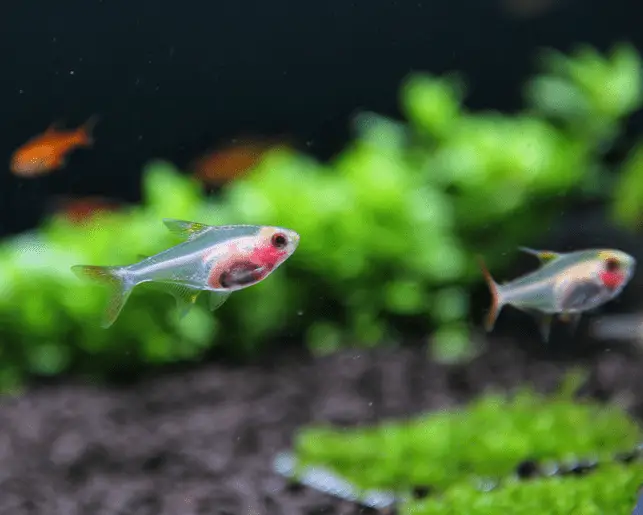
Diamond Tetras Schooling Behavior
Diamond tetras, like most other tetras, are generally peaceful fish species. Diamond tetras should be kept in small groups of the same species with around five or more. An interesting fact about diamond tetras is that they generally like being in schools of odd numbers. You may witness some fighting here and there, but this will not be related to aggressive behavior.
Neon Tetras Schooling Behavior
Neon tetras are small and relatively peaceful for fish of the same size and species. Neons need to be stored in groups of at least six at all times. If they get any fewer than this, there is a risk that they will become anxious and hostile toward one another. Remember that this is the absolute barebones requirement.
Neon tetras are known for being fin nippers, and it is not the best idea to keep them with any slow-moving or long-finned fish like Bettas or Angelfish.
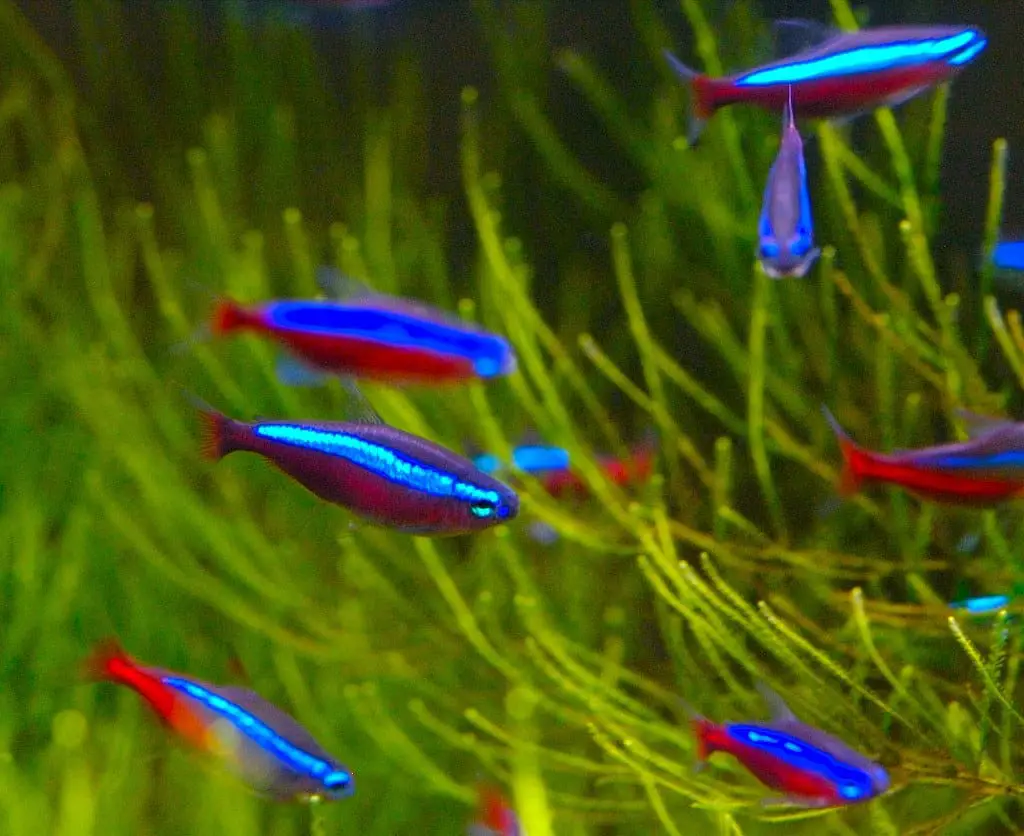
Lemon Tetras Schooling Behavior
Lemon tetras are peaceful and hardy schooling fish that like to be in big groups of the same species. Neons need to be stored in groups of at least six at all times. If they get any fewer than this, there is a risk that they will become anxious and hostile toward one another.
Because of their small size and how weak they are, lemon tetras can quickly become a snack for bigger fish. Avoid putting lemon tetras in the same tank as any large fish are known to be hostile. If you want to keep different species of fish in one tank, choose fish that are roughly the same size and have a calm disposition.
For more information about Lemon Tetras, you may find this article useful.
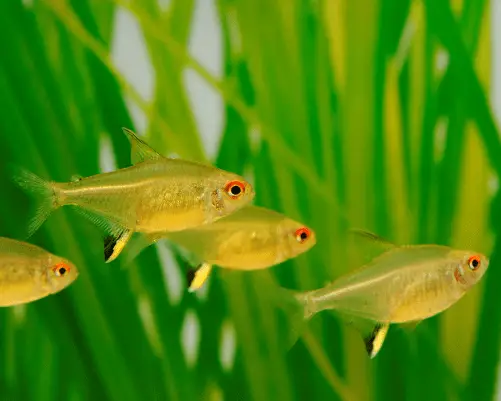
Conclusion
Tetras typically do not socialize with members of other tetra species due to their superior ability to cooperate with members of their species. It is much easier for members of the same tetra species to fool their predators if they all look the same. If the fish are similar in size and appearance, they may swim as a school.

